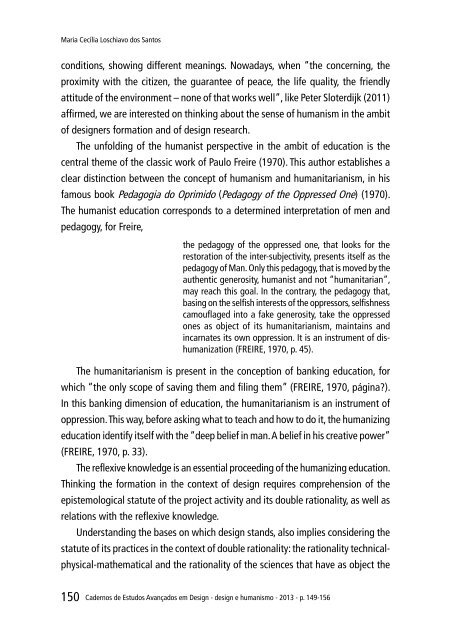o_19po8js951tvs1r0t1r8s4bb1vpla.pdf
You also want an ePaper? Increase the reach of your titles
YUMPU automatically turns print PDFs into web optimized ePapers that Google loves.
Maria Cecília Loschiavo dos Santos<br />
conditions, showing different meanings. Nowadays, when “the concerning, the<br />
proximity with the citizen, the guarantee of peace, the life quality, the friendly<br />
attitude of the environment – none of that works well”, like Peter Sloterdijk (2011)<br />
affirmed, we are interested on thinking about the sense of humanism in the ambit<br />
of designers formation and of design research.<br />
The unfolding of the humanist perspective in the ambit of education is the<br />
central theme of the classic work of Paulo Freire (1970). This author establishes a<br />
clear distinction between the concept of humanism and humanitarianism, in his<br />
famous book Pedagogia do Oprimido (Pedagogy of the Oppressed One) (1970).<br />
The humanist education corresponds to a determined interpretation of men and<br />
pedagogy, for Freire,<br />
the pedagogy of the oppressed one, that looks for the<br />
restoration of the inter-subjectivity, presents itself as the<br />
pedagogy of Man. Only this pedagogy, that is moved by the<br />
authentic generosity, humanist and not “humanitarian”,<br />
may reach this goal. In the contrary, the pedagogy that,<br />
basing on the selfish interests of the oppressors, selfishness<br />
camouflaged into a fake generosity, take the oppressed<br />
ones as object of its humanitarianism, maintains and<br />
incarnates its own oppression. It is an instrument of dishumanization<br />
(FREIRE, 1970, p. 45).<br />
The humanitarianism is present in the conception of banking education, for<br />
which “the only scope of saving them and filing them” (FREIRE, 1970, página?).<br />
In this banking dimension of education, the humanitarianism is an instrument of<br />
oppression. This way, before asking what to teach and how to do it, the humanizing<br />
education identify itself with the “deep belief in man. A belief in his creative power”<br />
(FREIRE, 1970, p. 33).<br />
The reflexive knowledge is an essential proceeding of the humanizing education.<br />
Thinking the formation in the context of design requires comprehension of the<br />
epistemological statute of the project activity and its double rationality, as well as<br />
relations with the reflexive knowledge.<br />
Understanding the bases on which design stands, also implies considering the<br />
statute of its practices in the context of double rationality: the rationality technicalphysical-mathematical<br />
and the rationality of the sciences that have as object the<br />
150<br />
Cadernos de Estudos Avançados em Design - design e humanismo - 2013 - p. 149-156



